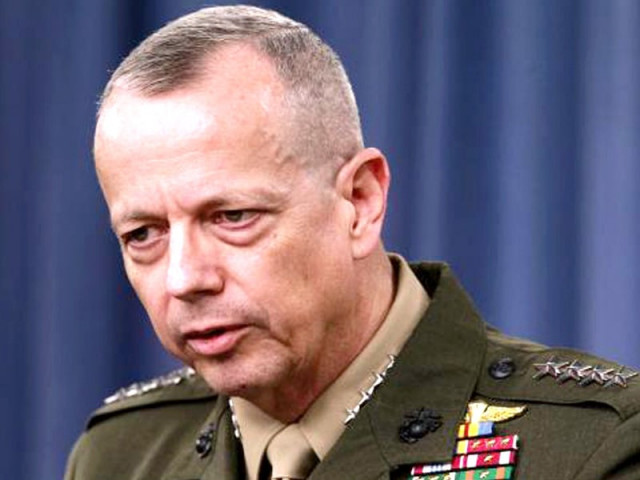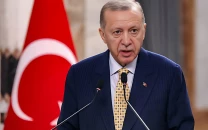NATO commander to press Pakistan on Haqqani network
Gen John Allen to meet Gen Kayani this week; review border coordination measures.

NATO commander to press Pakistan on Haqqani network
A top US commander, leading foreign forces in Afghanistan, will be visiting Pakistan this week amid renewed pressure by Washington to eliminate “terrorist sanctuaries” from the tribal belt.
US General John Allen, commander of the Nato/Isaf forces in Afghanistan, is likely to visit Pakistan on June 27 to review border coordination measures with army chief General Ashfaq Parvez Kayani, a military official revealed.
However, diplomatic sources said Washington would push Islamabad to move against the Haqqani network — one of the deadliest Afghan militants groups allegedly based in the tribal areas.
The US has blamed last week’s 12-hour siege on a lakeside hotel in Kabul on the Haqqani network.
“Afghan national security forces and coalition military sources acknowledge that this attack bears the signature of the Haqqani network, which continues to target and kill innocent Afghans,” General Allen had said last week.
His statement came just weeks after US Defence Secretary Leon Panetta said that Washington was running out of patience with Pakistan over its refusal to eliminate “terrorist havens”.
Pakistan has been resisting for years US pressure to go after the Haqqani network in North Waziristan. Its reluctance is attributed to the military establishment’s decade-old contacts with the Haqqanis and the belief that the group has a critical role in the Afghan endgame.
But in recent months, the Haqqani network has become a major thaw in the relationship between Pakistan and the US.
Relations between the two estranged allies are already strained because of several factors including the continued blockade of vital land routes for Nato forces by Pakistan.
A military official brushed aside the impression that Pakistan was deliberately shielding the Haqqani network. “We have five brigades in North Waziristan and we regularly take action against militants when it is required,” said the military official, who asked to remain anonymous.
Responding to a query, he said the decision to launch a full-scale military offensive in North Waziristan rests with the political leadership alone.
“You have to see several factors before taking any decision,” he explained referring to the economic and political implications of opening another front against militants.
Foreign ministry spokesman Moazam Ali Khan also denied allegations that Pakistan was reluctant to go after the Haqqanis.
“We have stated several times that Pakistan will not allow any terrorist sanctuaries on its soil,” he insisted.
An American official said the US wanted Pakistan to take steps that “dismantle the Haqqanis ability to launch attacks” against the foreign forces in Afghanistan.
“If they (Pakistan) can do it by bringing them to the negotiating table, we won’t mind,” the official pointed out.
Experts believe that with the election year in the US, President Barack Obama’s administration wants to bring some stability in Afghanistan but recent attacks in Kabul appear to be jeopardising those plans.
Published In The Express Tribune, June 26th, 2012.


1725099588-0/BeFunky-(41)1725099588-0-208x130.webp)
















COMMENTS
Comments are moderated and generally will be posted if they are on-topic and not abusive.
For more information, please see our Comments FAQ